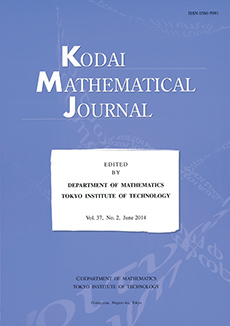Abstract
Let $f^1,f^2,f^3$ are three holomorphic curves from a complex disc $\Delta (R)$ into $\mathbf{P}^n(\mathbf{C})\ (n\ge 2)$ with finite growth indexes $c_{f^1},c_{f^2},c_{f^3}$ and sharing $q (q \ge 2n+2)$ hyperplanes in general position regardless of multiplicity. In this paper, we will show the above bounds for the sum $c_{f^1}+c_{f^2}+c_{f^3}$ to ensure that $f^1\wedge f^2\wedge f^3=0$ or there are two curves among $\{f^1,f^2,f^3\}$ coincide to each other. Our results are generalizations of the previous degeneracy and finiteness results for linearly non-degenerate meromorphic mappings from $\mathbf{C}^m$ into $\mathbf{P}^n(\mathbf{C})$ sharing $(2n+2)$ hyperplanes regardless of multiplicities.
Citation
Duc Quang Si. "Degeneracy and finiteness problems for holomorphic curves from a disc into $\mathbf{P}^n(C)$ with finite growth index." Kodai Math. J. 44 (2) 369 - 391, June 2021. https://doi.org/10.2996/kmj44209
Information





